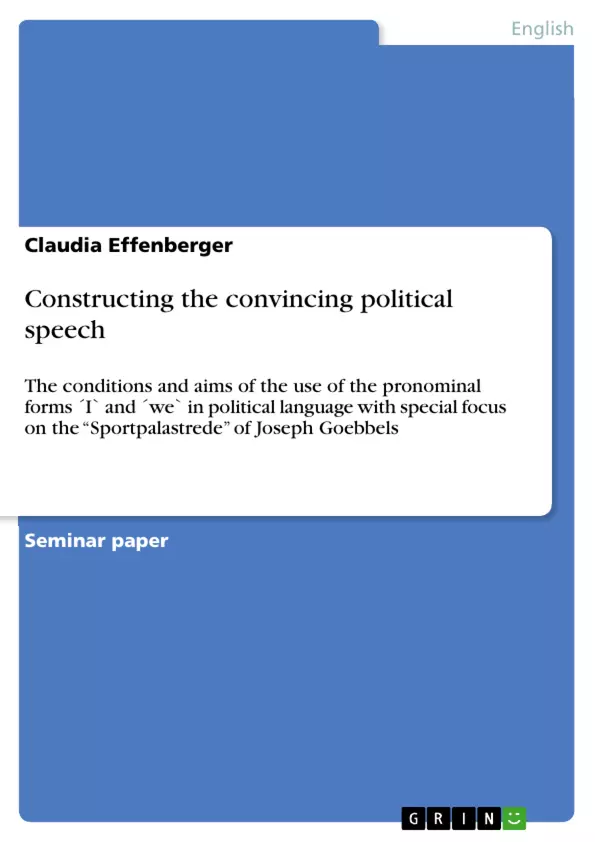If today one thinks of politics, politicians and their language there is one opinion that always comes first: All politicians are liars They are smooth-talkers who promise things they cannot fulfil only to get more votes in the coming-up election and they use beautiful words to paraphrase and disguise social injustices.
And in some points this opinion is right. There really is a specific political language used by the politicians to follow certain aims but this has not always to be disguise or circumscription. What many of the citizens simply ignore is the fact, that politicians are dependent from the mass. Without the public there would be no need for politicians. And the same goes for political discussions. Politicians don’t argue with each other because they like it. It is always the fact that a political actor starts political relations with another actor and at the same time with the public. If two politicians talk to each other on the television this is always orchestrated for the people who watch the show. (see Dieckmann 1981: 265) The main reason for every politician to lie or to use special vocabulary is for the purpose of being convincing. This paper analyses the language used by politicians in certain situations to convince people of the correctness of their point of view, in its’ roots, mainly based on the book Politically Speaking: The Pragmatic analysis of Political Language by John Wilson. The main focus of this paper is put to the question of the use of the pronominal forms ´I` and ´we` in political talk, under which conditions the one is used and when the other and what for. It is not arguable that politicians always have a reason for using ´I` or ´we` in different contexts, especially in written speeches that are planned and very well prepared. Also the difference between scripted and unscripted speeches will be touched in this paper. To employ the theoretical basis that is provided here, in the last section the famous “Sportpalast”-speech of Joseph Goebbels from 1943 will be analysed with regard to the use of different pronominal forms. The final summary shall bundle the gained information to a logical minimum and draw some conclusions from it. It will show if political use of speech is intentionally manipulating and disguising facts, especially in the example of Goebbels or if the use of language in politics does not differ in great parts from the day-to-day use at home.
Table of Contents
- Introduction
- Sociolinguistics and Pragmatics
- Definition of Pragmatics as sub-discipline of linguistics
- The interaction of Sociolinguistics and Pragmatics in political language
- Theoretical basis
- Truth, Linguistics and Pragmatics
- Political pronouns and pragmatic implications
- Political pronouns
- Myself and others
- Culture, Topic and Individual
- The use of pronominal forms in Goebbels` speech
- Analysis
- Resume
- Summary
Objectives and Key Themes
This paper analyzes the language used by politicians in certain situations to convince people of the correctness of their point of view, specifically focusing on the use of the pronominal forms "I" and "we". It examines how these forms are employed in different contexts and what effect they have on the audience. The paper draws on the work of John Wilson, specifically his book Politically Speaking: The Pragmatic analysis of Political Language, to explore the theoretical basis for this analysis. The "Sportpalast"-speech of Joseph Goebbels from 1943 is used as a case study to illustrate the application of these concepts in practice.- The role of language in political persuasion
- The use of pronominal forms "I" and "we" in political speech
- The pragmatic implications of using different pronominal forms
- The relationship between sociolinguistics and pragmatics in political language
- The analysis of the "Sportpalast"-speech of Joseph Goebbels
Chapter Summaries
- Introduction: This chapter introduces the topic of political language, particularly the use of "I" and "we" in political discourse. It emphasizes the importance of persuasion in politics and highlights the need for understanding the strategies used by politicians to achieve their goals.
- Sociolinguistics and Pragmatics: This chapter explores the intersection of sociolinguistics and pragmatics within the context of political language. It defines pragmatics as a sub-discipline of linguistics and explains its role in understanding the social context of language use. The chapter also discusses the importance of both disciplines for analyzing political speech.
- Theoretical basis: This chapter delves into the theoretical framework for understanding the use of "I" and "we" in political language. It discusses the concepts of truth, linguistics, and pragmatics, highlighting their relevance to the analysis of political discourse. The chapter also explores the pragmatic implications of different pronominal forms, considering factors like culture, topic, and individual identity.
- The use of pronominal forms in Goebbels` speech: This chapter presents a detailed analysis of the "Sportpalast"-speech of Joseph Goebbels from 1943. It examines the use of "I" and "we" in this speech, considering the conditions under which each form is employed and its intended effect on the audience. The chapter also discusses the overall rhetorical strategies used by Goebbels in his speech.
Keywords
The primary focus of this paper lies in examining the persuasive strategies employed by politicians, particularly the use of the pronominal forms "I" and "we". This analysis is grounded in the disciplines of sociolinguistics and pragmatics, aiming to understand the social and contextual factors influencing the use of language in political communication. The "Sportpalast"-speech of Joseph Goebbels serves as a case study to illustrate these concepts and analyze the specific rhetorical strategies employed by the speaker. The paper further explores the connection between language and political persuasion, delving into the theoretical framework of truth, linguistics, and pragmatics as applied to political discourse.- Arbeit zitieren
- Claudia Effenberger (Autor:in), 2006, Constructing the convincing political speech, München, GRIN Verlag, https://www.grin.com/document/118108



